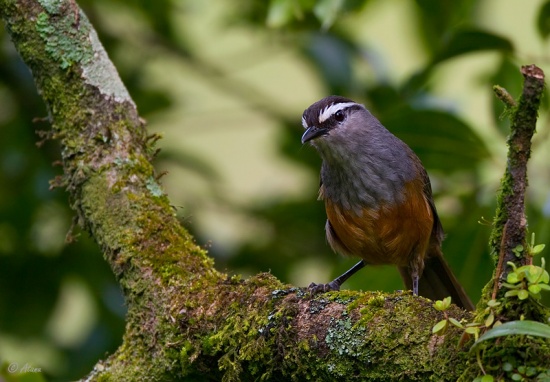Alternative name: Kerala Laughingthrush (without jerdoni); White-breasted Laughingthrush
- Garrulax jerdoni
Identification
20.5cm. A small laughingthrush.
- Dull olive-brown above
- Greyish-brown crown
- Narrow brown eye-stripe
- White supercilium
- Greyish cheek, upper breast and throat
- Rusty-chestnut flanks and vent
- jerdoni with black throat
Distribution
Asia: Endemic to southwest India. Found in the Nilgiri-Hills in Kerala and Tamil Nadu.
Restricted-range species, fairly easy to see in certain places like Munnar.
Taxonomy
Subspecies[1]
- G. j. jerdoni:
- Hill forests of south-western India (Western Ghats in Coorg region)
- G. j. fairbanki:
- Southern India (Palni and Anaimalai hills and northern Kerala)
- G. j. meridionalis:
- Hill forests of south-western India (southern Kerala)
Some authorities place jerdoni within Rufous-breasted Laughingthrush.
Has also variously been placed in genus Strophocincla or Trochalopteron.
Habitat
Scrub and secondary forest, thickets along streams in tea and cardamon plantations, sometimes gardens, edges of broadleaf forest. Recorded at 800 - 2135m.
Behaviour
Feeds on insects, berries and fruit.
Forages in undergrowth and low bushes, usually in groups of 6 to 14 birds, sometimes more.
Breeding season from December to June. The nest is a cup made of coarse grasses, moss and bracken leaves. It's placed in a bush or among tall brackens up to 3m high. Lays 2 eggs.
Resident species.
References
- Clements, JF. 2008. The Clements Checklist of Birds of the World. 6th ed., with updates to December 2008. Ithaca: Cornell Univ. Press. ISBN 978-0801445019.
- Avibase#Del Hoyo, J, A Elliott, and D Christie, eds. 2007. Handbook of the Birds of the World. Volume 12: Picathartes to Tits and Chickadees. Barcelona: Lynx Edicions. ISBN 978-8496553422
- Rasmussen, PC and JC Anderton. 2005. Birds of South Asia: The Ripley Guide. Barcelona: Lynx Edicions. ISBN 978-8487334672
Recommended Citation
- BirdForum Opus contributors. (2024) Palani Laughingthrush. In: BirdForum, the forum for wild birds and birding. Retrieved 23 May 2024 from https://www.birdforum.net/opus/Palani_Laughingthrush




